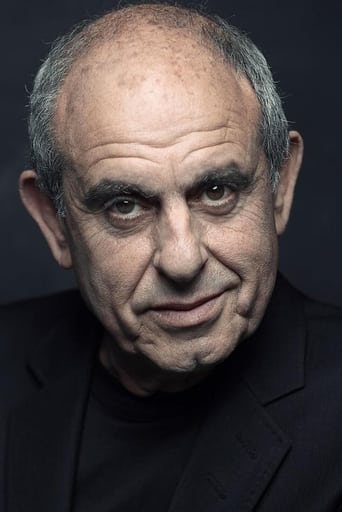SnoReptilePlenty
Memorable, crazy movie
ShangLuda
Admirable film.
SpunkySelfTwitter
It’s an especially fun movie from a director and cast who are clearly having a good time allowing themselves to let loose.
Frances Chung
Through painfully honest and emotional moments, the movie becomes irresistibly relatable
room102
I'm usually harsh on our local filmmaking, but this is truly an excellent film, one of the top 10 Israeli movies I've seen. A simple low-key drama about the tension between a father and son - two professors in the same field of studies.This movie is a prime example of a fantastic storytelling: Excellent direction, score, editing and writing, combined with a performance of the lead actor. This is how your take a simple story and turn it into a fantastic experience.who is well known as a comedian and does a fantastic job here in a dramatic roleI enjoyed the movie even more on the second viewing. Shlomo Baraba is well known as a comedian and I had a hard time getting used to seeing him in a dramatic role. This time I didn't have that problem. He was excellent and does a fantastic job in this dramatic role.What I was missing is a dramatic scene by the wife: When she goes to his bed (why are they not sleeping together? Is she mad at him? We're not told), the scene was crying for a dramatic speech by the wife, something in the "Oscar speech" material - and we didn't get it, which is fine for the story, but too bad for the movie as it seems like a missed opportunity.
Andres Salama
This bittersweet comedy from Israel is set in the rarefied world of academia and is a fine, interesting movie about the bitter relationship between a father and a son who both happen to be Talmudic scholars working at the Hebrew University of Jerusalem and how their rivalry finally overcomes their filial obligations.Eliezer Shkolnik (a terrific performance by Shlomo Bar Aba) is the father, and he seems a personification of male old age grumpiness. He looks at the at the rest of his colleagues with an insufferable air of intellectual superiority, and believes he hasn't been recognized to the extent that he deserves, yet the movie hints he is a bit of a fraud himself, his main claim to fame is having been thanked in a footnote in a book by a famous Talmudic authority. The more successful Uriel (Lior Ashkenazi, who usually plays young macho men, but here plays a middle aged academic against type) is the son. The film lampoons Uriel for being a lightweight scholar and for being too attracted to the media spotlight, yet he seems to be the more psychologically rounded of the two. The tense relationship between father and son finally comes to a bitter confrontation when the elder Shkolnik is mistakenly awarded an important academic prize that was meant for the son (I'm not going to reveal anything else about the plot).I'm also obviously not going to reveal the ending but it seems underwhelming and unrealized, as if the director Joseph Cedar didn't knew how to end the movie. Thus, what was a fine film until then ends in a curiously unsatisfying way. Nevertheless, this is a fine movie with many great scenes. I especially liked two scenes: one is set in a small but tightly packed conference room and ends when one academic shoves another to the wall. In the second scene, a very pretty female journalist goes to the home of the elder Shkolnik to interview him and manages to get him to say very nasty things about his son.
peter henderson
The use of on screen checklists as the start of "Footnte" to establish the identities of the lead characters is a clever and engaging way to get the viewer in the mood for a humorous cinematic experience. The comic devices - the chair shuffling in the fatal meeting of the Israel Prize committee - evinces that sort of cruel but loving satire that made "Spinal Tap" such a rich experience. (If you don't like the comparison, check out the final scene in which Nigel, air guitaring the solo in "Sex Farm" - the song that has taken off on the Japanese charts - is called back on stage and back into the arms of the rejuvenated band)But then the mood of "Footnote" changes, with the spirited and dignified defense by the son of his father's worthiness for recognition. Nobility of spirit is a phrase that comes to mind. The viewer realizes that Cedar is a director and writer of substance. This satisfying realization is enhanced when the father's chief detractor relents in his opposition to the loyal son. And then Cedar once again changes the mood of the film, with the father's critical dismissal of the worth of his son's scholastic achievements. By this time the viewer is in no doubt as to the masterful direction and writing and is speculating on how the characters will work out the dramatic culmination of the film.I was reminded of "Ve'Lakhta Lehe Isha" ("To Take a Wife"), the 2004 film created by Ronit and Shlomi Elkaberz. "Footnore" is a lot more fun, a lot less harrowing but I recalled my "Eureka" moment while watching that film, when I realized it was a retelling of the biblical book of the prophet, Hosea. Had Cedar created a similar cinematic parable? Had Cedar tapped into some rich vein of cultural material to make a point, argue a thesis, establish some view of Israeli society?The expression, "Chekovian" came to mind. I was reminded of Sidney Lumet's 1968 cinematic recreation of "The Seagull". It remains for me the only re-working of the turn of the twentieth century Chekov's dramatic output that has ever really translated the validity of the characters and situations into the mindset of a mid to late twentieth century audience. Cedar has achieved a similar feat, in making the life experiences of modern Israelis intelligible to outsiders.The open ended culmination, the cryptic subtitle, "Professor Shkolnik's Revenge" leaves it open to the viewer to make the same mistake as the people who mixed up father and son when contacting the winner of the Israel Prize. Is the subtitle referring to the father of the son?The richness of the characterization makes the film a lot more satisfying than many of the films that criticize the values of Israeli society. Take for instance, "Lemon Tree", or even "Waltz With Bashir". Cedar gives us much more rounded and human (dare one say less caricatured) characters. But the viewer is left with the feeling that Cedar is saying something of substance about Israelis society. I was wrestling with this question as the film neared (but never fully enunciated) its dramatic climax.Is he saying that the elder generation or Israeli leadership is misguided in the way they govern? Is he saying that the next generation must value what is good in their parents, but seek to rectify the mistakes they have made? The way the film raises such questions marks it as a cinematic experience of great distinction as well as a thoroughly engrossing and satisfying way to spend time with characters of warmth, complexity and genuine decency
ann
You really must be Israeli to understand it all, but some ideas can get through to anyone. Cedar the producer was once phoned up and told he would receive the "israel prize". He immediately told the man who phoned him that he should be telling his father and not him. So this is the origin of the film. What happens if the father is phoned (instead of his son) and has been waiting for the prize for many years, only the politics in the academy have prevented it? The reaction of the son (who has already had many awards) is exemplary, much to the disdain of the head of the committee who hates his father. And this message of "honour thy father" is something we should all be getting from the film, especially in a world (academic world too!) where everyone seems to be looking only to increase his own honour.





